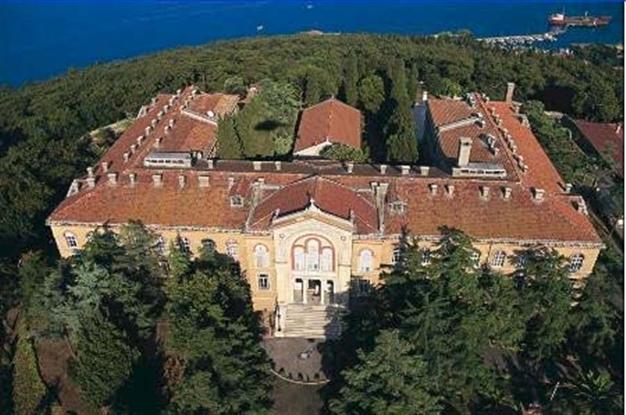We favor the reopening of Greek Seminary, but Greece should review attitude: Deputy PM
ISTANBUL

The Halki Greek Orthodox Seminary, ocated on Heybeliada Island in the Marmara Sea off Istanbul, was closed in 1971 after a Supreme Court ruling upon the decision of the Greek Patriarch. Hürriyet photo
Deputy Prime Minister Bülent Arınç has said the government is supporting the reopening of the Halki Greek Orthodox Seminary after being closed for more than four decades, but also expressed his disappointment at the measures undertaken by Greece against Turks and Muslims living in Western Thrace.
“We consider the question [of the theological school’s reopening] from the viewpoint of the Lausanne Treaty and religious freedom. But while we are working for the religious rights of minorities, what is happening in Greece saddens us. The word ‘Turkish’ in the name of many associations has been forbidden, despite rulings from the European Court of Human Rights,” said Arınç in a press conference after a Cabinet meeting.
According to the Lausanne Treaty, Greeks and other religious minorities should enjoy equal rights with Turkish citizens.
Turkish media reports have recently indicated that the reopening of the Halki Seminary is once again on the table. The Education Ministry and Turkey’s Higher Education Board (YÖK) have accelerated work for its reopening upon the instructions of Prime Minister Recep Tayyip Erdoğan, daily Hürriyet reported today.
Without denying the reports and acknowledging the Greek community's need of more ecclesiastics, Arınç emphasized the government’s discomfort regarding the attitude of Greece toward the Turkish minority in Western Thrace, in the north of the country.
Highlighting that Greece did not respond positively to the needs of muftis, Arınç added that Prime Minister Erdoğan would be calling his Greek counterpart to speak about the issue before heading to Qatar on Monday evening. “Greece has taken the right to appoint muftis and teachers from the hands of the Turkish community. Our Foreign Minister [Ahmet Davutoğlu] told them [at the time], ‘Would you like us to appoint the [Greek] Patriarch?’ stating that this attitude was unfriendly,” he said.
The Supreme Court decided in 1971 that all higher education facilities had to be connected to a state university. The Halki Seminary, located on Heybeliada Island in the Marmara Sea off Istanbul, was considered a “private higher education facility” at the time, and so had to be tied to a state university or a state seminary in order to stay open after the ruling. As the patriarchate was unwilling to associate the school with a Turkish university, the seminary was closed down.
According to Hürriyet’s report on Jan. 28, the government was searching for a formula that would allow the Seminary to function as a professional school. An alternative formula would be to change the necessary article in the Constitution. However, such a change would pave the way for other minorities, such as Armenians and Jews, as well as Muslim Turkish citizens, to open their own religious schools, says the report.
